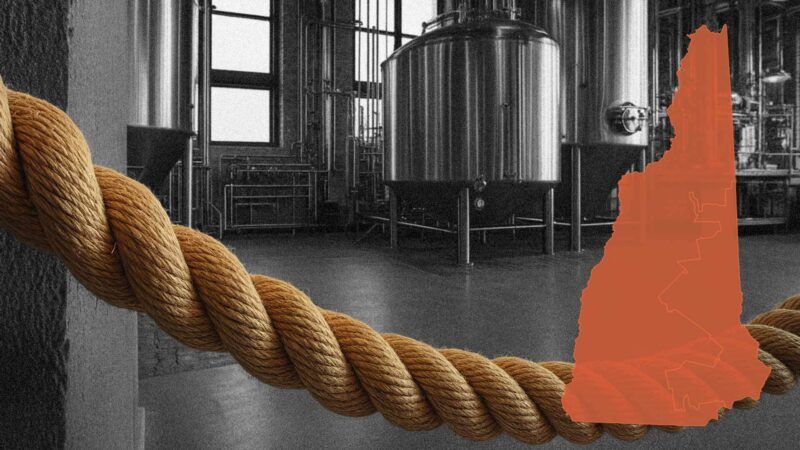New Hampshire's New Booze Law Will Hamstring the State's Brewpubs
Despite passing two bills to reduce barriers to enjoying a drink, the Granite State is making it harder for brewpubs to grow.

The rationale behind New Hampshire's new brewpub regulation is more headache-inducing than the beer.
On Friday, New Hampshire Gov. Kelly Ayotte (R) signed House Bill 242 into law. The bill, sponsored by state Rep. John Hunt (R–Rindge), will take effect in August and limits brewpubs in the state to self-distributing their beer to only one additional restaurant or business outside their premises. The bill is a follow-up to H.B. 1380, also sponsored by Hunt in 2024, which limited the amount of beer or cider a brewpub could sell to 2,500 barrels a year and permitted licensed brewpub owners to obtain licenses to sell their product on their premises in bars and at off-premise locations like grocery stores, so long as they didn't have a manufacturing license.
If the law sounds like it will keep brewpubs small, that's because it's intended to do so. "This is what we call a very inside baseball bill," Hunt told the New Hampshire Bulletin.
Hunt said that H.B. 242 was designed to preserve the state's current regulatory system, describing New Hampshire as a "three-tier state," where businesses operate as either beverage manufacturers, distributors, or retailers. By restricting brewpubs from becoming a one-stop shop that acts as a "bottler…distributor" and "retailer," Hunt said the bill is intended to safeguard the "monopoly" held by beer distributors in the middle tier of this system."Frankly, I think the relationship between the distributors and the licensees (retailers) is pretty sacred, and it works well, and there's no reason to upset them."
The bill was supported by the state's restaurant and lodging trade group. "You have to understand, in order for one of these brewpubs to make enough beer to self distribute to more than one additional location, they would have to make an enormous amount of beer…and frankly, most of them didn't think they could make enough beer to even distribute to another location," Mike Somers, president and CEO of the New Hampshire Lodging and Restaurant Association, told the New Hampshire Bulletin. "Most of the folks in the industry that I've talked to didn't really feel that the restriction was much of a restriction, because they could now own multiple brewpubs and restaurants."
Rather than having the freedom to ramp up production and distribution, Somers contends that brewpub owners would rather start new brands and businesses from scratch.
This wasn't the only booze-related bill that passed the governor's desk: Ayotte also signed H.B. 467 and let H.B. 81 become law without her signature. H.B. 467 allows municipalities to create designated "social districts" where people can legally consume alcohol outdoors. These areas must be clearly marked with signs indicating the permitted times and boundaries, and all alcohol must be purchased from businesses within the district. Separately, H.B. 81 permits restaurant patrons to bring their drinks with them to the restroom.
While both laws ease some restrictions on consumer alcohol use, they stop short of meaningfully reducing the state's overall control of alcoholic beverages. And now, New Hampshire's brewpubs will face more hurdles to scaling up the production and distribution of their beer.
In keeping with that spirit, the state would be better served by promoting policies that encourage innovation, rather than anticompetitive laws like H.B. 242 that restrict consumer choice and unfairly penalize brewpubs for their market success.
Editor's Note: As of February 29, 2024, commenting privileges on reason.com posts are limited to Reason Plus subscribers. Past commenters are grandfathered in for a temporary period. Subscribe here to preserve your ability to comment. Your Reason Plus subscription also gives you an ad-free version of reason.com, along with full access to the digital edition and archives of Reason magazine. We request that comments be civil and on-topic. We do not moderate or assume any responsibility for comments, which are owned by the readers who post them. Comments do not represent the views of reason.com or Reason Foundation. We reserve the right to delete any comment and ban commenters for any reason at any time. Comments may only be edited within 5 minutes of posting. Report abuses.
Please to post comments


Sarckles hardest hit. In the past, he always took making a short trip to NH to get blitzed for granite.
Maybe switch to pot and get stoned?
New Hampshire is famous for its socialist liquor stores.
Still a lot cheaper than neighboring states.
Separately, H.B. 81 permits restaurant patrons to bring their drinks with them to the restroom.
Yeah, but which restroom, hmm?
Sarc supports this. When he needs to take a piss test, just using the alcoholic beverage will result in a lower number versus him pissing into the cup.
I don't understand this protection at all. I am skeptical of any article at Reason that purports to talk about this issue. I have seen how screwy the interpretation of the CO laws are re this. The thing that is similar between CO and NH is that these liquor laws originate in the way in which the two states tried to deal with the end of Prohibition.
In the case of CO, they wanted to prevent the Mafia from taking over liquor distribution by limiting retail to one outlet. In the case of NH (like in many states), it looks like they tried to limit that by creating state monopolies. Reforming those laws is long overdue - but I don't trust Reason at all re the motives here. I suspect Reason is merely in the pocket of whichever corporate crony wants to control all reform.
The State monopoly is one of the things they use to avoid an income or sales tax. Socialism works.
What is so sacred about the three tier system? I don't see how it prevents excessive drinking or serves an economic purpose such as promoting competition.